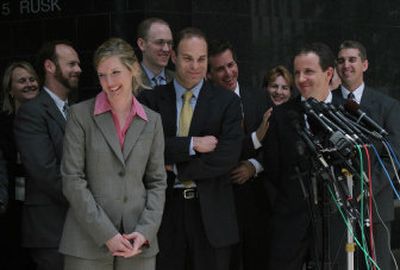Enron execs gambled, lost with decision to testify

HOUSTON – For more than two years, Kenneth Lay portrayed his prosecution as a witch hunt that rose from the rubble of Enron Corp. It was no secret that he planned to testify in his own defense.
And a lawyer for Jeffrey Skilling, Lay’s co-defendant in the historic, four-month fraud and conspiracy trial, told jurors of his client: “You could not keep him off that witness stand.”
For both men, it was an enormous gamble, and last week they both paid dearly for it. The former Enron chief executives were convicted of a total of 29 criminal counts, and are likely to spend many years – perhaps the rest of their lives – in prison.
“I wanted very badly to believe what they were saying,” juror Wendy Vaughan said after the verdicts were announced. “There were places in the testimony I felt their character was questionable.”
The sheer number of charges, along with the fact that appeals courts are less likely to overturn jury verdicts – and both sides praised the judge’s handling of the case – augur poorly for the men’s chances of avoiding significant prison time if they appeal.
For white-collar criminal defendants – and their expensive lawyers – deciding whether to take the stand is never an easy decision, and legal experts conceded the Lay-Skilling trial was no different.
After all, the federal Enron Task Force had wrung guilty pleas from 16 former Enron executives, and lined up eight of them to testify against their former bosses. Leaving those charges simply unanswered might have been an equal gamble.
But legal experts, while stressing that Monday morning quarterbacking is all too easy, said the decision to testify was probably a mistake – particularly for Lay, who quickly grew angry and combative when cross-examined by a federal prosecutor.
Not only did the Enron founder have less to defend himself against – he faced six charges to Skilling’s 28 – Lay had more to lose in terms of his image before he got on the stand. And, what happens there can be so unpredictable, experts said.
“He has an image of being a warm, well-spoken ambassador for the company. And when he did take the stand, he came across in a very different way, in a way that the jurors apparently found arrogant,” said Greg Markel, chair of litigation at Cadwalader, Wickersham & Taft LLP.
Skilling and Lay are to be sentenced Sept. 11, and both are likely to get double-digit prison terms. Outside court, Skilling’s lawyer and Lay himself both insisted the men were innocent.
Analysts said staying off the witness stand may have been less of an option for Skilling, who was forced to defend himself against 10 insider-trading counts related to his sale of Enron shares.
Jurors acquitted him on nine of those counts but convicted him of one – a $15.5 million sale six days after Sept. 11, 2001. Skilling initially told investigators he sold because of market fears after the terror attacks, but he had tried on Sept. 6 to sell 200,000 shares. On the stand, Skilling said he simply forgot that attempt.
Skilling was also convicted of 18 counts of fraud, conspiracy and lying to auditors. Some jurors said they could not reconcile Skilling’s testimony with his reputation as a hands-on manager.
“It’s hard to believe someone, such a hands-on individual, could not possibly know some of the things going on in the company,” jury forewoman Deborah Smith said.
Legal experts also said they were surprised Lay and Skilling said on the witness stand – indeed, based their entire defenses on the idea – that there was no overarching fraud at Enron.
David Berg, a Houston civil litigator who has published a book about juries, called it “the Peter Pan defense – clap real hard and Enron will reappear, and nothing wrong happened. Well, plenty wrong happened.”
He said it may have hurt Lay that, having been denied a request to have his case heard separately from Skilling’s, he then chose to pursue a unified defense with Skilling.
In that case, it may have helped if Lay had at least stayed off the stand, Berg said.
“If Lay had not testified, I think it would have allowed the jury to focus their attention on Skilling and to conclude that Lay was a victim of Skilling rather than a cohort,” Berg said.
The four and a half years since Enron’s collapse touched off an era of corporate scandal are littered with examples of executives who took the witness stand and paid the price for it.
Former WorldCom Inc. CEO Bernard Ebbers and former Tyco International Ltd. CEO L. Dennis Kozlowski were convicted after taking the stand and insisting they did nothing wrong.
On the other hand, Martha Stewart decided not to testify at her trial on charges of lying about a 2001 stock sale and was convicted anyway – and at least one juror said afterward that he would like to have heard her story.